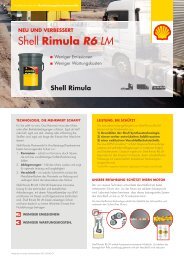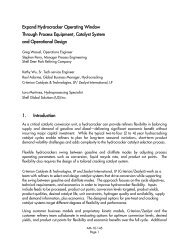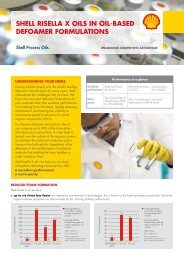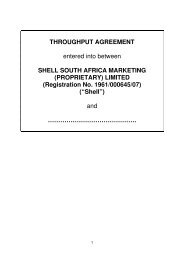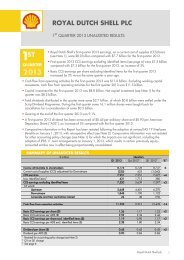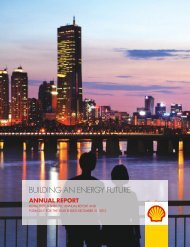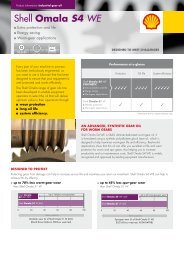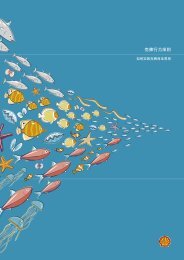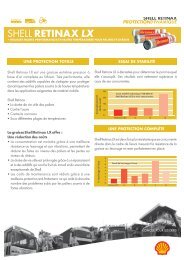Summer 2008
Summer 2008
Summer 2008
- No tags were found...
Create successful ePaper yourself
Turn your PDF publications into a flip-book with our unique Google optimized e-Paper software.
SHELL WORLD UK welcomeDear Colleagues,SHELLWORLDUKI am delighted to be able to welcome you to this second edition of Shell WorldUK magazine. In successive issues of the magazine, we hope to feature aspects ofthe several Shell businesses across the UK. In this edition, we have a number ofarticles covering our Exploration and Production business.Our Exploration and Production business has been a leading player in theNorth Sea for over 30 years and has remained the largest investor in the firstpart of this decade. Shell is a leading operator in the UK sector of the NorthSea with 34 platforms and 3 Floating Production Storage Offtake vessels, 16subsea installations, interests in 60 fields (51 operated) and 3 onshore gasplants (St. Fergus, Mossmorran, Bacton). We are a vital resource to both Shelland the UK.In this issue, we start by taking a look at the range of employee networks we haveat Shell in all our UK locations (see pages 11-13). These networks help us tocelebrate our diversity, which in turn brings a wealth of opportunities for all ofus to share with and learn from others. If you aren’t already part of a network,hopefully you may be inspired to join one after reading more about the widerangingbenefits they can offer us all.Following on the theme of getting to know more about the lives of yourcolleagues, you can also discover what life on an offshore platform is really likeby turning to pages 7 - 10, where Paul Gartshore from the Brent Charlieplatform gives us a glimpse into his and his colleagues’ daily lives.Staying up in Aberdeen, we showcase the excellent work being done on theExploration and Production Cost Transparency Project on pages 14 – 16. Thisteam uses innovative software to improve control on business spending, makingcosts more immediately visible to users within the Supply Chain, Finance,Operations and Maintenance areas. If you have ever had a headache with yourbudget, this article will provide some valuable insights for you.Finally, remember that the team at Shell World UK magazine are alwaysinterested to hear from readers. Please see page 3 for details on how to get intouch with them. I also want to offer my congratulations to everyone whoentered the Shell World UK magazine strap line competition - I was delighted tosee so many superb entries. See page 4 to find out who the winner is.Enjoy the magazine.John GallagherShell Exploration and ProductionVP, Technical - EuropeCONTENTSLife onMars?Find out what life onan offshore platform isreally like.Life on Mars? SHELL WORLD UK07For most people, the concept of working offshore iscompletely foreign and raises all sorts of questions –how do people get to work? Where do they sleep? Howlong is the working day? What’s the food like and is it asgood as home cooking? And what are the biggestchallenges to living and working offshore?14 21CHOOSING SHELLESS manages a wide range of services, fromLife onBrent CharliePlatformShell World UK SpoKe topaUl GartShore, an operationStechnician on the Brent charlieplatform in the north Sea.TRAVELLING TO WORK“My journey offshore is by aeroplane and helicopter.We take an aeroplane from Aberdeen to the ShetlandIslands and a helicopter from there. Before we cantravel on a helicopter, we have to complete survivaltraining! This is when you are belted into a helicopterframe and sunk into a swimming pool – upside down,the right way up and in any other combination –several times. In the very unlikely event of needing todo so, you could then use the skills acquired duringtraining to escape. It may seem scary, but it’s actually alot of fun and there are divers in the water to ensure oursafety.”LIVING OFFSHORE“Accommodation on the Brent Charlie Platform ismade up of two accommodation blocks; a newer,larger block and an older block that we’venicknamed ‘the dungeons’ as they are positionedreally deep compared to the new block. The layout ismuch like that of a hotel, with rooms opening off acorridor. In each room there are two bunk beds builtinto the wall. Although people are offshore atdifferent times, we tend to be paired with someonewe know well, and often the same person.Contractor personnel with less regular schedules arepaired up more randomly.“Meals are taken on the second floor in the galleywhere there is a buffet-styled serving area and a ‘helpyourself as many times as you like’ policy, which isgreat! The food is excellent and the choice varies hugelyfrom steaks, pizza, pasta dishes, and fish dishes to saladsand on occasions we have special themed meal nightssuch as American, Indian, barbeque and Italian.Usually, after work, the platefuls you see guys take backto their table are so big you wouldn’t be able to eat for aweek! Breakfast runs from 05:30 – 07:00, lunch from11:00 – 13:00 and dinner from 17:30 – 19:00.“Leisure time is also catered for and there’s a smallcinema, a number of lounges with television, anInternet café, a quiet room, a library, a snooker tableand a gym. Christmas and New Year are the best timesof the year for social activities as there are a lot oforganised competitions such as pool, snooker, darts,dominoes, chess and cribbage.”03Editor’s lettersYour feedback about the first issueof Shell World UK.05news in briefFind out about the new Channel Gatewayopening, the annual Shell Regatta andLondon Array.11networking 9 to 5What are the benefits of havingorganisational networks? Be inspired toget involved…14THE COST TRACKING JOURNEYCost transparency is a key part of Shell’s drivetowards first-quartile performance – butwhat does it mean for you?17SOMETHING TO TALK ABOUTWe talk to Hugh Mitchell about his thoughtson the Shell People Survey and what it meansfor Shell.19tHE ENERGY CHALLENGEDavid Clarke, Director of the EnergyTechnologies Institute, talks to us aboutthe UK government-industry partnershipto develop and deploy new low-carbonenergy technologies.catering to utilities management, across allShell locations in the UK – meet the peoplebehind the scenes.23People andEnvironmentWe talk to Shell’s Vice Presidentof Sustainable Development aboutthe publication of the 2007Sustainability Report.25Technology andInnovationEveryone’s talking about them: we take alook at biofuels and how Shell is taking thelead in developing the next generation.27SHELL IN THE COMMUNITYWe talk to Shell Foundation BusinessManager Rosanne Gray about thefascinating projects she has been involvedin around the world.29Out of HoursSee what some Shell people get up to intheir spare time.27 SHELL WORLD UKSHELL WORLD UK
EditorShelley HoppeManaging EditorKay BruceTo contact themagazineShell World UK, CA-CX,Shell Centre, London,SE1 7NAE-MailShellworlduk@shell.comWebsite addresswww.shell.co.uk/shellworldukShell World UK isedited, designedand produced byThe Fifth Business4th floor71 Broadwick Street,London W1F 9QY, UKPh: +44 0207 534 9099ContributorsNicole ErasmusAnnalisa FiorentinoMurray NathanOliver UitenbroekShane O’DonoghueYOURMAGAZINEEDITOR’S LETTERSDear Editor,I was impressed by the Clearing the Air DVD,which you sent with the new magazine andthought the seven-minute clip would be of directinterest to my local Suffolk EnvironmentalForum, of which I am the Founding member. Isee on the slip that the DVD cannot be shown toa public audience. Are there any exceptions tothis ruling? I’d like to show it at my nextSteering Group meeting.Yours sincerely,Guy AckersDear Guy,Thanks for your letter – we’re glad you likedthe DVD. Our understanding is that you canshow the DVD in the situation you describe.The Brand Team can advise you and anyoneelse wishing to show the DVD to externalgroups, and provide some supporting notes.Please contact Venetia Howes on+44 0207 934 2510.Dear Editor,I was very disappointed to note the omission of Fife NGL inthe Shell World UK magazine promotional launch banner,and I know many of my staff felt the same. The generalconsensus of opinion was that every other Shell location in theUK was included, with the exception of our little “corner” ofScotland. FNGL consists of the Mossmorran GasFractionation Plant and Braefoot Bay Marine Terminal,two key locations in Shell’s operations in the UK, so I hopeyou understand my disappointment.Best regards,Alex BairdDear Alex,We’d like to offer you and anyone else who was notaccurately represented our sincere apologies. We’rereally keen to show the full range of Shell operationsacross the UK, so please do keep the magazine inmind and contact us with any story ideas orcomments you have.The Shell BrandPromise in yourwordsIn the previous issue of Shell World UKwe featured an article on the new Shellbrand strategy. In the brand booklet thatis included with this issue, you can readwhat some Shell people have said, intheir own words, about the meaningand relevance of the brand promise:• We are positive about the benefitsof energy.• We reject complacency.• We apply creative, persistent problemsolving to secure a responsibleenergy future.We hope you enjoy reading them andthat it stimulates your own reflections onwhat the brand means to you and howyou can apply it in your day-to-day job.AND THEWINNER IS...Thanks very much to all the readers whosent in their ideas for the straplinecompetition. The standard of the ideas wereceived was very high, making choosingone winner extremely difficult.Here is a sample of the best runners up:“Responsible Energy” – sent in by Franklin Umole, The Hague“U-Powered” – sent in by Andrew Storm, London“Open, Honest and Informative” – sent in by Eamonn McGettrick, Shell Pensioner“Unite in Knowledge” – sent in by Harriet Grudge, Wythenshawe“Shared Vision for a Brighter Tomorrow” – sent in by Mike Collinson, Aberdeen“Delivering Today, Creating Tomorrow” – sent in by Harry Mann, London“Energy in Action” – sent in by Simon Hill, St. Fergus LabroratoryHowever, in the end the evaluating panelchose “People in Energy” sent in byAlun Rees from Aberdeen.Well done Alun and thanks forparticipating. Your prize is on itsway to you now.Alun’s Prize:A Shell WildlifePhotographer ofthe Year portfolioUnless otherwise specified,copyright in text, images andother information in Shell Worldmagazine belongs to ShellInternational B.V. or othercompanies. Permission is given toreproduce, store or transmit anypart of this publication providedthat the copyright of ShellInternational B.V. or such otherShell company is acknowledged.This does not include the right toamend or modify text, images and/or other information and it does notextend to any material of which thecopyright is identified as belongingto a third party (i.e. other than ShellInternational B.V. or othercompanies). Authorisation toreproduce such third-party materialmust be obtained from the relevantcopyright holders.WE USE RECYCLED PAPERDear Editor,I saw the new magazine and liked it!Unfortunately I was out of the office when itwas launched and didn’t get one myself. Canyou please send me a copy?Many thanks in advance!Kind regards,Oliver KleiberDear Oliver,Of course we can – we wanted everyone toreceive a copy. From the Autumn issueonwards (due out in September) we will notbe desk-dropping the magazine. Themagazine will be available in reception andstaff areas and will be sent personally to thosewho sign up to receive a copy. So the best wayto ensure you receive a personal copy is tosign up. It only takes 30 seconds online:www.shell.co.uk/signup. And remember,anyone can sign up, whether they are internalor external to Shell.Meet the teamIf you have any feedback, or would like to suggestcontent, please contact us.Shellworlduk@shell.comShell World UK, CA-CX, Shell Centre, London,SE1 7NAShelley HoppeEditorE-Mail: Shelley.Hoppe@shell.comPh: +44 207 534 9099Kay BruceManaging EditorShell UK CommunicationsE-Mail: Kay.Bruce@shell.comPh: +44 207 934 7780SUBSCRIBE TO SHELL WORLD UK MAGAZINERemember, you can sign up to receive Shell World UK magazine quarterly, forfree. So please opt in as soon as possible to receive future copies, either byadding your details to our distribution list via our website atwww.shell.co.uk/signup, or by writing to us.If you would like to contribute to the magazine, or give any feedbackon this issue, please contact us.Email: Shellworlduk@shell.comPost: Shell World UK, CA-CX, Shell Centre, London SE1 7NASHELLWORLDUK SHELL WORLD UKSHELL WORLD UK
Life onBrent CharliePlatformShell World UK spoke toPaul Gartshore, an OperationsTechnician on the Brent Charlieplatform in the North Sea.TRAVELLING TO WORK“My journey offshore is by aeroplane and helicopter.We take an aeroplane from Aberdeen to the ShetlandIslands and a helicopter from there. Before we cantravel on a helicopter, we have to complete survivaltraining! This is when you are belted into a helicopterframe and sunk into a swimming pool – upside down,the right way up and in any other combination –several times. In the very unlikely event of needing todo so, you could then use the skills acquired duringtraining to escape. It may seem scary, but it’s actually alot of fun and there are divers in the water to ensureour safety.”LIVING OFFSHORE“Accommodation on the Brent Charlie Platform ismade up of two accommodation blocks; a newer,larger block and an older block that we’venicknamed ‘the dungeons’ as they are positionedreally deep compared to the new block. The layout ismuch like that of a hotel, with rooms opening off acorridor. In each room there are two bunk beds builtinto the wall. Although people are offshore atdifferent times, we tend to be paired with someonewe know well, and often the same person.Contractor personnel with less regular schedules arepaired up more randomly.”Life on Mars?For most people, the concept of working offshore iscompletely foreign and raises all sorts of questions –how do people get to work? Where do they sleep? Howlong is the working day? What’s the food like and is it asgood as home cooking? And what are the biggestchallenges to living and working offshore?“Meals are taken on the second floor in the galleywhere there is a buffet-styled serving area and a ‘helpyourself as many times as you like’ policy, which isgreat! The food is excellent and the choice varies hugelyfrom steaks, pizza, pasta dishes, and fish dishes to saladsand on occasions we have special themed meal nightssuch as American, Indian, barbeque and Italian.Usually, after work, the platefuls you see guys take backto their table are so big you wouldn’t be able to eat for aweek! Breakfast runs from 05:30 – 07:00, lunch from11:00 – 13:00 and dinner from 17:30 – 19:00.”“Leisure time is also catered for and there’s a smallcinema, a number of lounges with television, anInternet café, a quiet room, a library, a snooker tableand a gym. Christmas and New Year are the best timesof the year for social activities as there are a lot oforganised competitions such as pool, snooker, darts,dominoes, chess and cribbage.” SHELL WORLD UKSHELL WORLD UK
I miss myfamily, but my teamand work mates havebecome a second family.It’s a close-knit community andI’ve worked with the samepeople for the past six anda half years.Paul GartshoreOperations TechnicianWORKFORCEDEMOGRAPHICSThere is a perception that the offshore population isageing and lacks diversity. Oil & Gas UK researchedthis. Let’s take a look at some of their findings:• The average age for total United KingdomContinental Shelf personnel is 41.0 years. This isabout the average you would expect for aworkforce ranging in age from 20 to 60 years old. Itis not an indication of an ageing workforce.• The numbers of females employed by the offshoreindustry has increased gradually over recent yearsand women now account for 3.5% of thepopulation. In 2006, just under 1,800 femalepersonnel travelled offshore; the majority employedin the catering sector.• 117 nationalities were present within the UnitedKingdom Continental Shelf workforce in 2006,with workers from the UK accounting for 85.1%of all personnel.Please note that these photos show day-to-day lifeon a number of different platforms and are notexclusively images of Brent Charlie.WORKING OFFSHORE“A 12-hour shift is standard offshore and asan Operations Technician, I’m assignedeither a day or night shift. Recently, therotations changed to promote a betterwork-life balance. Now, OperationsTechnicians and core maintenance worktwo weeks on and two weeks off, two weekson and then four weeks off. This thenrepeats throughout the year.”“As an Operations Technician, I’mresponsible for a specific area such as a gas,oil, water, air system or utility area and Iensure the equipment is in good workingorder. Each area demands a different skilland knowledge and OperationsTechnicians usually work on a differentarea each rotation.”“Training is hands on and trainees areassigned a mentor who instructs themon the different areas. My mentorworked offshore for 25 years and nowI look after trainees.”“Safety is vital, and over the years therehave been huge safety improvements. Inthe last two years, safety advisors havebeen introduced and this has proved verysuccessful. A full-time medic also works a12-hour shift and is on call at night.”“Our key focus is ‘Total Reliability’ and‘Operational Excellence’ – projects aimedat improving maintenance andinspections. The platform initially had alife expectancy of 25 years and is now 30years old, so we update equipment andinfrastructure to ensure continuedreliability and excellence.”“The relationship with onshore hasimproved over time. With newtechnology, the teams are able to holdvirtual meetings with onshore staff andthere’s great interaction.”CHALLENGES“The weather has a huge impact onmorale, particularly when it delaysreturn journeys home. If peoplecan’t get back, they continueworking and the maximumnumber of consecutive workingdays is 21. After that, you have totake it easy. The team are verygood at getting people backonshore quickly if necessary.”“Adjusting to onshore can betough. If you’ve done the nightshift, it can take three or four daysto come around. It’s like being ina different time zone. If you’vebeen on the day shift, you settleback into things quite quickly.”“Family can find the adjustment difficulttoo but, after time, they become used tothe way of life. Initially my young nieceused to forget and wonder who I was eachtime I saw her. Now that she’s older, wehave a great relationship as I can spendgood quality time with her every day I’mhome. I have a few workmates withchildren and they find that they havebetter relationships with their children asthey’re able to spend longer periods ofquality time with them, instead of seeingthem at night for a few hours before theygo to bed, if working nine to five.However, it is difficult when you can’t bethere for special moments.”“Calling home is free nowadays and thisinitiative has proved a great moralebooster. I miss my family, but my teamand work mates have become a secondfamily. It’s a close-knit community andI’ve worked with the same people for thepast six and a half years.”“The best part aboutworking offshore is thetime off, the salaries andthe team.”This post box is unique toBrent Bravo. Offshore boxesare emptied in time to catchreturn helicopter flights acouple of times a week.Mail then enters the normalpostal system.did youknowfacts aboutthe brent field• The Brent field is situated 186km(116 miles) offshore, northeast ofLerwick, Scotland, at a water depthof 140m. (459 ft)• The Brent field is made up of fourlarge platforms: Alpha, Bravo,Charlie and Delta.• The Brent field was discovered in 1971and oil production began in 1976.• Following a £1.2 billion developmentproject in the mid 1990s, Brent becamea gas field; which extended its life bymany years.• Over 30 years of operation, the fieldhas produced almost 2 billion barrels ofoil and 6 trillion cubic feet of gas –supplying vital crude oil and up to10% of the UK’s gas needs.• The Brent Charlie platform is the sizeof about five football pitches and is theequivalent of a 10-story hotel in height.• The Brent Charlie Platform personneltotal approximately 150. This is madeup of core personnel, such asoperations and maintenance staff aswell as contractors. SHELL WORLD UK SHELL WORLD UK 10
NETWORKING9-5Find out more about the benefits of joiningan organisational network.Alistair KillickAlison GreigEmployee networks . . .A large multinational organisationemploys an enormous variety of people –people from diverse cultures andbackgrounds, people with differentexpertise and experience and people withdiffering interests and inspirations. Thisdiversity brings a wealth of possibilitiesand an opportunity for all of us to sharewith and learn from others. Employeenetworks are one way in which we cando just that.The Shell D&I guidelines defineemployee networks which forward thecompany’s D&I agenda as “voluntarygroups of people that come together insupport of common goals and interests,which are aligned with the company’sD&I vision, policies, values, businessobjectives and the People Standard.Employee networks operate on theprinciples of inclusion, open dialogueand constructive contribution.”The history of networksat Shell . . .The first D&I network for Shell UK wasthe Shell Women’s Network. Started bytwo American women, the network hasnearly 1,200 members today. “Mostnetworks at Shell have been formed by apassionate group of people, who have gottogether and approached HR forguidance,” says Alison Broomfield, headof D&I for Shell in the UK.“Other networks, such as the disabilitynetwork, enABLE, were initially HRdriven.We wanted to know whether wecould do more for those people at Shellwho have a disability, as well as to find outwhat would attract, retain and progresspeople with disabilities.”There is a strong business case for D&Inetworks. Simon Desjardins, member ofthe gay and lesbian network (GLN)explains: “I do not think peopleimmediately associate the oil and gasindustry with a friendly and diverseenvironment. Our D&I philosophy is ahuge draw card, though!”The GLN network believes that the bestway to change this perception in <strong>2008</strong> isby promoting an even more inclusiveenvironment. This will be done bydelivering engagement sessions and atargeted communications campaignexploring what it means to be lesbian,gay, bisexual or transgendered in theworkplace and the GLN’s role insupporting its members and the business.All networks at Shell areinclusive . . .Joining a network provides employeeswith immediate support for personal orprofessional challenges that they may befacing. And, while you may not identifywith a specific network yourself, you maywant to empathise with a relative or closefriend who does. Becoming a “friend” ofthe GLN could help you support a gayrelative, for example, or if you have aspecial skill, such as being fluent in signlanguage, you could always offer this tothe disability network, enABLE.People who belong to one network oftenparticipate in others as supporters orfriends of networks, providing a linkbetween the two.Networks also aim to be geographicallyinclusive. Alison Greig, member of theShell Women’s Network, works from herhome near Manchester. Alison explained:“The invitations to events are sent out toall members on the distribution list wellin advance so I’m able to plan ahead andschedule in other meetings at the eventlocation for the same day. At the momentI’m mentoring two staff in London and Imake sure that I tie meeting up with themwith other appointments. There is also avirtual phone mentoring circle, whichenables home-based and remote staff toget involved.”Career development . . .Beyond the support given by others facinga similar challenge in the workplace, thereare many further benefits. Tonya Popova,employee relations advisor for Shell CentreUK, observed: “Like everywhere, personalnetworking is very important in Shell. Youmight meet people from your future team,or maybe your potential boss throughthose networks. Just getting things done ismuch easier if you know the right personto talk to. Networks allow you to connectwith people at different levels of seniority.”Alistair Killick, Central Finance ITStrategy Manager, joined Shell in January,2006. Alistair is a member of theExperienced Hire Network and has foundit hugely beneficial: “I was relieved whenI found common ground with severalnew starters in the network and I enjoyedthe freedom to talk about work issues in arelaxed and tolerant way,” he says. “Ithink this has helped me to keep on topof the challenges faced by new joiners. Ihave met lots of new people throughnetworks – and my original mentor isnow my boss!”Most networks also provide group learningevents. These don’t duplicate Shell OpenUniversity courses but provide tasters ofbigger courses. Energie, a network for earlycareer professionals, holds half-daylearning and skills events that don’t go intoas much detail as the official three day onesoffered by Shell Open University, but areeasier to access because they require less ofa time committment.Mentoring schemes are also offered.Grace Alalade, Chair of the AfricanNetwork, says: “We are very proud of thesuccess of our executive mentoringscheme. Participants are paired withsenior members from across the functionsand businesses. This cuts across thedivisions and gives participants a valuableunderstanding of the business as a whole.We also run mentoring circles where tento twelve participants work together witha mentor on particular themes. Thismeans more members have access tonetworking, advice and support.”These educational benefits are open tonon-members – networks can often playa part in raising awareness of issues thatmay affect a wider group. For example:Shell’s project management traffic lightsystem is impossible to read for those whoare colour blind. Once brought to lightby the enABLE Network, people foundthat this could easily be solved by writing“R” for “red” or “G” for “green” on top ofthe colour.What’s more, networks can bringabout changes in company policy.Alison Broomfield recalls: “Recently,Shell’s Women’s Networks in the UKand the Netherlands prompted astudy on the progression and retentionof women in the work place. The studycame out with 20 differentrecommendations which have resulted innew initiatives to help women at work.”Personal development . . .Then again, networks can simplyprovide a new means of socialising.Andrew Brown, an audit manager forDownstream, recognises that workingin a large organisation, constantlyundergoing change,perhaps even in avirtual team, can bepersonallychallenging,potentially evenGetting it right ondiversity andinclusiveness bringscompetitive advantage.We are a moreattractive employer, wehave more creativityand we do a better jobof serving our verydiverse customer base.James SmithUK Country Chairman11 SHELL WORLD UK SHELL WORLD UK 12
TECHNOLOGY& INNOVATIONEveryone’s talking about them – we take a look at biofuels.What exactly are Biofuels?Biofuels are produced from biomass such as plants or organic waste – the two maintypes of first-generation biofuels used commercially are ethanol and FAME (fatty acidmethyl esters)• Ethanol is made by fermenting and distilling plant sugars produced by sugarcane, maize and wheat. It can be blended with gasoline.• FAME is produced by a chemical reaction between vegetable oil (e.g. rapeseedoil, palm oil or soybean oil) and an alcohol. It can be blended with diesel.UK Government targets state petrol and diesel must contain 5% biofuel by2010, while Europe has pledged that biofuels will make up 10% of transport fuel by2020. The Renewable Transport Fuel obligation came in on April 15, <strong>2008</strong>.For more information aboutthis article, or to submit aTechnology & Innovationarticle idea, contact:Shellworlduk@shell.comFUELS OFTHE FUTUREPlanes, trains and automobiles . . . Our worldincreasingly demands mobility and it is predictedthat the number of cars will likely grow from under abillion today to 2 billion by 2030, and the thirst forfuel from all forms of transport will jump by 45%.The issue of biofuelsis one that occupies atremendous amountof our time.Joanna PedleyGeneral Manager, Fuel ProductsThis rising demand for mobility, thepotential shortage of oil in the long term andfears about climate change have led to someradical new thinking about where we sourceour liquid fuels from.Remember Back to the Future? In the finalscenes of the 80’s sci-fi comedy, crackpotscientist Doc Brown bursts back into the1985 “present” to whisk Marty McFly off to2015. Rummaging around in the dustbin,he reveals that 30 years into the future hisDeLorean DMC12 is powered by refuse.Hollywood poetic licence? Well, we’re a wayoff from powering cars with literallywhatever’s lying around but screenwriterBob Gale’s vision of 2015 may not be so farfrom the truth – vehicles are alreadypowered by petrol and diesel blended withbiofuel made from plants. And, in five to 10years time the amount of biofuel in the totalfuel pool could increase and come from ahost of new sources.BiofuelsBiofuels have been hailed as a potentialsolution to the economic and environmentalproblems associated with increasing mobility.Broadly speaking, biofuels are made frombiomass, which is organic matter or recentlyliving organisms and their by-products(usually plants). When used in vehicles, theyemit similar amounts of CO 2 to oil-basedfuels but the biomass they are made from hasrecently absorbed CO 2 from the air, duringgrowth. In theory, this leaves the carbonbalance neutral.However, the actual CO 2 reduction achievedby a biofuel depends on the journey it hastaken. Energy is needed to grow and harvestraw materials, convert them into biofuels andthen distribute them. Each biofuel can take adifferent path.“The issue of biofuels is one that occupies atremendous amount of our time,” saysJoanna Pedley, General Manager of FuelsProduct Management at Shell. “Theworld’s energy market is set to double by2050. Over that same period, the levels ofCO 2 emissions need to be halved fromtoday’s levels. Today, transport contributesaround 25% of the world’s CO 2 emissionsas they relate to energy. And the demandfor energy is only set to rise as mobilityincreases around the world, particularly inemerging markets.”First generationConventional or “first generation” biofuelsinclude the most widespread biofuel,ethanol, made from crops such as sugar caneor maize and the second most widespread,FAME (fatty acid methyl esters), often madefrom rapeseed, palm or soybean oil.Shell is the world’s largest distributor andcurrently buys, trades, stores, blends anddistributes these conventional biofuels,distributing more than 5 billion litresaround the world.However, today’s standard vehicle enginescan only use fuel with small amounts ofethanol or FAME blended in (5–10%) –and there is the added issue of sustainability.SustainabilityAlthough critics accept that there arebeneficial biofuels, first-generationbiofuels are currently getting some badpress. Critics point to the amount of CO 2that is generated during the production ofthe crops; the problem of using arableland to produce fuel not food, and theissue of clearing rainforests to make wayfor biofuel crops.Shell introduced a sustainable sourcingpolicy in 2007 and continues to work closelywith suppliers, pressing for CO 2 reductionand social and environmental safeguards,recognising that today’s increasingproduction of conventional biofuels calls forthese measures as well as an agreed way ofunderstanding each biofuel’s overall CO 2production. More widely, Shell is playing anactive role with non-governmentalorganisations and governments to helpshape emerging international standards.The second generationEven with these new standards, the factremains that conventional biofuels use foodcrops. If biofuel production is to scale up tohelp meet growing transport fuel demand,then non-food raw materials need to bedeveloped. This means looking at newsource materials, new processes and new fuelproducts beyond ethanol and FAME.Shell is a leader in this research anddevelopment of next-generation biofuels.Our technology division, Shell GlobalSolutions, has a dedicated bio-team workingat several centres around the world and Shellhas forged a number of partnerships, bothacademic and commercial, to accelerate thework. The aim is to narrow down thetechnology options to a feasible set ofcommercial solutions. Examples include theinitiatives with German company,CHOREN and Canadian company, Iogen.With CHOREN, Shell is working todevelop a high-performance fuel calledBiomass-to-Liquids made from forestresidue and waste wood. The fuel promisesto reduce CO 2 production by up to 90%compared to conventional diesel.With Canadian company Iogen, Shell isworking to develop the fuel ethanol fromwheat straw. The partnership has developedand the design and feasibility of a full-scalecommercial plant are now being assessed.Other current programmes include:• Creating an even more advancedenzyme for processing non-foodbio materials with the UScompany, Codexis.• Developing a catalytic process toconvert biomass into gasoline andgasoline blend components with the UScompany, Virent.• Constructing a pilot facility in Hawaiiwith HR Biopetroleum, a US company, togrow marine algae and produce vegetableoil for future conversion into biofuel.Algae hold great promise because theygrow very rapidly, are rich in vegetable oiland can be cultivated in ponds of seawater, minimising the use of fertile landand fresh water.“We believe we are leading the way forwardin the development of second generationbiofuels,” says Joanna Pedley. “However, thetechnology is still in the early stages. It willbe another five to 10 years before thesebiofuels are being made in decent quantitiesfor commercial supply.”So – not quite a DeLorean DMC12 fluxcapacitor just yet, but Doc Brown wouldprobably still approve.did you knowBiofuels from 100years agoBiofuels aren’t a new idea. TheModel T Ford, first produced in1908, was designed to run onethanol, and Rudolf Diesel, whoinvented the diesel engine in1892, ran his demonstrationmodel on peanut oil. Biofuels fellout of favour whenindustry realisedpetroleumbasedfuelswere easierand cheaperto produce.25 SHELL WORLD UKSHELL WORLD UK 26
SHELL IN THECOMMUNITYOne of my lasting impressions is of a women’sgroup in Nairobi, making wood stoves andsinging their hearts out.Rosanne GrayBusiness Manager, Shell FoundationTHE SHELL FOUNDATION WAS FORMED BY SHELL IN 2000 AND IS ANINDEPENDENT UK REGISTERED CHARITY WITH A GLOBAL MANDATE.Photos of Shell Foundation Initiatives (3)Shell FoundationAs Business Manager for the Shell Foundation, Rosanne Gray hastravelled to some of the most beautiful and troubled parts of the globe.She joined the Foundation in July 2006 as a member of the BreathingSpace team with responsibility for Africa and China and is currently amember of the Trading UP team. Rosanne says:“I was first drawn . . . to the idea of workingfor the Foundation after a two-year stint incommercial fuels in South Africa. During mytime there, I travelled extensively traininglocal sales teams. This experience and theinsight into a country with supply chainproblems, made me realise that I wanted toexplore this further and build on the linkwith Africa. Plus, my mother is fromZimbabwe and I’ve always felt a spirituallink to the country.“The Shell Foundation . . . is not somethingthat is widely known about at Shell, but it hasbeen the best move for me personally. Youhave experiences here that you just can’t getin the mainstream business, and the businessdecisions you make affect people in such afundamental way. You have to understandconsumers on low incomes – their prioritiesare very different from the first world –smoky air at home would be just oneexample. Joining the Foundation has enabledme to share the skills I acquired at Shell and Ilearn a lot from the people I coach too.“A typical day . . . with the Foundationwould not be in the office. It’d be in a villagein India working with the local people andlocal marketing teams to understand theproblems around indoor air pollution. We’dbe in women’s kitchens, traditionally a sacredplace, asking the questions: “How do we getenergy- and emissions-efficient stoves frommanufacture to remote and ruraldestinations?” Or I’d be visiting a SouthAfrican raspberry farm that supplies Marks& Spencer. We work with our key strategicpartners to create sustainable small businessesand a sustainable supply chain.“I have travelled . . . a lot with Shell, but thistravel is different and to interesting parts ofthe world – you’re not in a Shell office or ahotel room! I never imagined I’d be doingthat. I’ve travelled to India three or four timesand to China and Africa too. One of mylasting impressions is of a women’s group inNairobi, making wood stoves and singingtheir hearts out. It was so uplifting! I’ve seenso many incredible things.“My greatest challenge . . . is working withsmall start-up companies and encouragingthem to have a big vision and passion andbecome sustainable so that they don’t needto rely on grant cheques to operate in thelong term.“The greatest reward . . . is buildingrelationships with partners all over theworld and seeing the success. You can makea real difference and we have seen livesimproved by better living conditions andsustainable work. People feel empoweredand exhilarated.“My memories of Africa . . . The reliefand excitement in Uganda on women’sfaces as we demonstrated a cleanercooking stove; eating injera for five daysin northern Ethiopia and bouncing overpotholes in Kenya. This is what makes thehard work worthwhile.“In the future . . . I see myself moving backinto the Shell business. I think you can reallyadd value by returning to the mainstreamShell business. You understand the bigpicture and the external perspective and youunderstand how to leverage the strengths ofShell better.”THE ORIGINSThe Foundation came about out of anunderstanding that for Shell to prosper andgrow in the future, financial gain needs to betempered by care for the environment andconcern for people. As a result, theFoundation invests in projects that reducepoverty and address environmentalchallenges arising from the impact ofenergy and globalisation.Shell has given the Foundation a $250million endowment and an additional 10-year commitment of $160 million. In 2012,the Foundation aims to be self-financing,with an annual income of $20 million.THE APPROACHA truly sustainable solution to the challengesof poverty and the environment requires asolution that is financially viable and easilycopied to maximise impact.The Foundation believes the best way toachieve this is by applying market principlesand business DNA – business thinking,models and discipline – to globaldevelopment challenges.The Foundation team has extensivebusiness experience and shares this with itsstrategic partners. The team visits theprojects and acts as business consultants todevelop the model and help people to actand think as a business.Beyond working with strategic partners, theapproach includes committing funds and,where appropriate, leveraging the valuecreatingresources – the infrastructure, brandand knowledge – of Shell.LEVERAGING RECOURCESThe Foundation believes multinationalcompanies have a hugely importantbut, as yet, largely untapped potentialto use business know-how and assets –rather than just money – to tackleglobal problems.At the moment, there is no localvolunteering system for theFoundation. However, there areopportunities to volunteer in Shell -see below for more information.Information forShell EmployeesIf you are keen to help insome way, find out aboutvolunteering opportunitiesat your UK location:London:Colin.Greenwood@shell.comAberdeen:Margaretha.Simpson@shellcomMossmoran:Eileen.Spence@shell.comSt Fergus:Norma.Pert@shell.comChester:Rachel.Evans@shell.comThornton:Jane.K.Davis@shell.comGlasgow:Fiona.Laurie@shell.comPROGRAMMESBreathing Space - Reducing thenumber of deaths caused by indoorair pollution.• Three billion people or more thanhalf the world’s population still cookover open fires or traditionalbiomass fuels such as wood, dungand crop waste.• Indoor air pollution generated in thisway causes more than 1.5 millionpremature deaths each year.• The vision is to see 10 million stovessold in five countries in the nextfive years.• More than 1 million women andchildren around the world benefitfrom cooking stoves that are moreenergy and emissions efficient.Trading Up - Giving developingcountry producers improved accessto world markets.• More than a million ethically sourcedbouquets of flowers have been soldat Marks & Spencer.• The success of the bouquets –available in more than 350 stores –is helping to protect 30,000 hectaresof wild flower or fynbos meadowswhile creating 135 sustainable jobsin an area where three out of fourpeople are unemployed.Aspire - Supporting the start-up andgrowth of small and medium-sizedenterprises in Africa as a way to reducepoverty.EMBARQ - Easing the traffic congestionand pollution clogging developingcountry mega-cities.Excelerate - Helping to providemodern energy and infrastructure servicesto poor people.Take a look at the Shell Foundationwebsite to find out more about theseprogrammes: www.shellfoundation.orgThese brands are the trade marks of theShell Foundation.27 SHELL WORLD UK SHELL WORLD UK 28
OUT OFHOURSShell people get up to some amazingly diverse activities outside work.Out of hours takes a look at three inspiring stories.Climbing has literallychanged my perspectiveof the world!Malcolm KentI didn’t want tobe overtaken by aCornish pasty!”Sarah MarshallShellhas been sosupportive of myfundraising efforts.Bob NolanRiding Deafblind“Being a bit crazy helps,” says Bob Nolan, of his tandem ride from Land’s Endto John O’Groats which kicked off on May 31 and finished on June 16 – anexhausting 1,000 miles. He aims to raise a record amount for DeafblindScotland, a national charity based in Glasgow, of which he is Chairman.Bob, a Petrophysics Portfolio Consultant and Global project manager inExploration and Production, suffers from Usher Syndrome, which hasrendered him 65% deaf from birth, and due to Retinitis Pigmentosa, diagnosedin his mid-twenties, he is slowly going blind. Despite this, Bob feels lucky tohave reached his 50th birthday with a little central vision: “I believe that youshould focus on what you have and not what you don’t have.”Bob’s teammate was his wife Louise, who is profoundly deaf, and while Bobprovided the man-power at the back of the tandem, Louise navigated from thefront and on the road. They communicated with each other by lip reading viaa wing mirror. While the team trained together twice a week, Bob trained soloon an exercise bike when he had the chance.“Riding a tandem bike is tough,” he says. “I find it hard not having any controlof the bike, which can be quite scary when we are going quickly – but othersmight see that as a good thing!”Bob, who has also completed several Edinburgh and London marathonsfor Deafblind Scotland, didn’t choose the easiest route to cycle.Dartmoor, the Mendips, Northern Manchester and the Scottish hillsincluding Rannoch Moor threw some very hilly terrain in their path. “Ihave never attempted such a long bike ride before,” Bob says, “butfrankly, I was most worried about getting a sore bum.” Overnight staysdonated by hotels and friends along the route enabled the couple to resttheir aching limbs.Leashless!Accompanied by his parents, Shellgeoscientist Malcolm Kent toddledup his first mountain in the SwissAlps aged six.Since then, nothing has held him back – as hiswebsite “Leashless” will testify. In his spare time, he canbe found climbing a combination of rock and ice – a tougherclimbing phenomenon than climbing just rock or ice alone. Itinvolves climbing impossible-looking features and you need tobe very confident in your own abilities. “It’s not so much thenature or landscape that drives me to do it, more the physicalgymnastics of pushing your body to its limits. Climbing reallycounteracts a full week behind a desk,” he says.Inevitably, there have been a number of close shaves along theway for Malcolm, aside from the usual scrapes and bruises. Ice issuch a changeable and fragile medium to climb that he has foundhimself stuck up a mountain on many an occasion, battlingtemperatures of down to minus 40 degrees, as he waits for the iceto change. So what does Malcolm do when he’s up there? “It canbe hard,” he says. “I usually play cards, write in my journal, orlisten to music – my iPod never seems to freeze!”Despite the geographical spread of mixed climbers (the namegiven to those who climb both rock and ice), there is a thrivingsocial scene in the community globally. “You tend to follow theice around in this business and so it’s inevitable that you keepbumping into the same people. I met loads of people at theClimbing World Cup a few months ago.”Marathon SuccessIt’s amazing that Sarah Marshall made it round all 26 milesof the London marathon – incredibly, injuries with her calfmuscles have meant that she only had two weeks of actualtraining prior to the event. As a busy Atlantic SupplyFinance Analyst, this meant a run at lunchtime, cycles toand from the Shell Centre and a few snatched trainingsessions after work, thanks to the longer evenings.Shell World spoke to Sarah the day after her marathonrun: “I’m really stiff today, but really elated and so glad Igot round in one piece!”Sarah was impressed by the collective goodwill in the air.Loads of people were running for personal reasons orfulfilling personal challenges and Sarah, an ex-army officer,was running for the Army Benevolent Fund. She says: “TheArmy Benevolent Fund does such a lot of good work withinthe forces, and they in turn do a lot of good work for thecommunity. Everyone was so supportive of each other. Apersonal highlight was when a couple of soldiers came upand thanked me for supporting them.”After a commendable 4 hours and 28 minutes, shehad the finishing line and the bottle of champers thather mum and brother had brought with them in hersights. Her biggest anxiety, as she crossed the line, wasthat she would be outshone in her finishing photos bya life-sized Cornish pasty. “We were neck and neck forthe last mile of the race,” she said, “but I managed toditch him right at the end!”It was hard to miss Bob and Louise on the road – they were decked out in ultravisibilityjackets, Deafblind Scotland t-shirts, a flag and flashing lights. Theywere also tailed by a support van all of the way. Bob would like to thankeveryone who has sponsored and supported the challenge and particularly“Shell, who have been very supportive of my work for Deafblind Scotland”.Bob continues: “Deafblindness is a low incidence disability and not as easy asan animal or children’s charity when it comes to fundraising. We need to raisethe profile any way possible and hope to fund a new resource centre fordeafblind people eventually – a centre of excellence where deafblind peoplecan be enabled to reach their full potential.”If you would like more info on Bob’s bike ride and to make a donation,please visit www.justgiving.com/bobstandemrideWe’d love to hear from you –if you would like to be featuredin a future article, or have anyquestions or feedback pleasee-mail us at:Shellworlduk@shell.comSee page 3 for our fullcontact details.Mixed climbing is cold, perilous and timeconsuming– so why does Malcolm do it?“Climbing has completely changed myperspective of the world – quite literally!” hesays. “The things that used to bother me don’tany more, plus I don’t value materialpossessions in the way that I used to. I climbeda route on El Capitan in Yosemite Valley acouple of years ago and watched all the queuesof cars forming like little ants – I realised thatI was happier up at my 600m vantage pointthan I would have been down below.”Sarah has raised an impressive £1,300 for the ArmyBenevolent Fund so far, and is still collecting – so, ifyou owe her money, pay up! She would like to thankall those Shell colleagues who have sponsored andsupported her run.On the mental and physical endurance of the whole dayshe says: “It was the best of people, on display, en masse.”If you would like to contribute to Sarah’s fundraisingefforts, please visitwww.justgiving.com/sarahlondonmarathon<strong>2008</strong>29 SHELL WORLD UK SHELL WORLD UK 30
United KingdomShellGlobalHelplineA 24 hour Helpline for you to seekhelp or to report a concern of a legalor ethical nature.LOCAL TOLL-FREE0808–234–7406https://www.compliance- helpline.com/Shell.jspBe suresww.shell.com/codeofconduct31 SHELL WORLD UK



